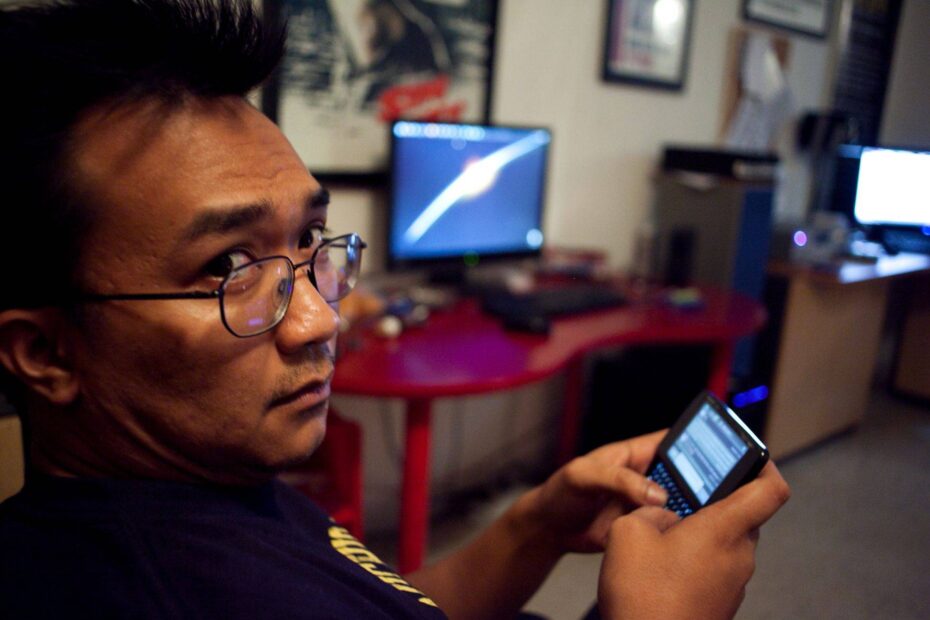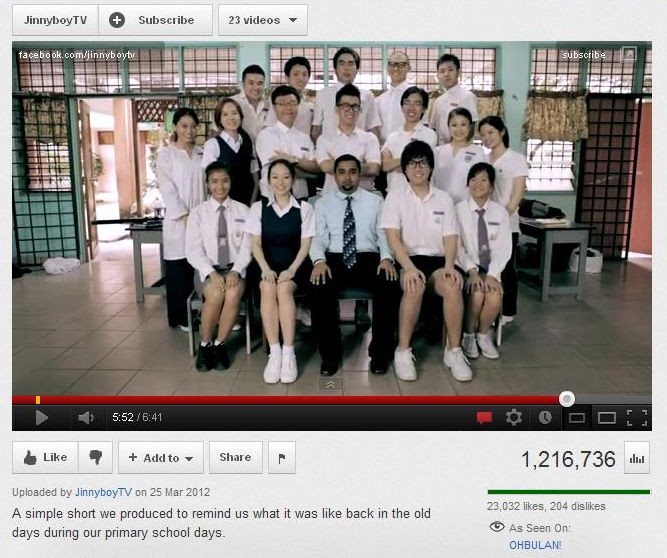By IAN YEE and KEVIN TAN
alltherage@thestar.com.my
IF the term “YouTuber” is new to you, don’t worry – we hadn’t heard of it either, at least not until we spoke to Jin Lim, 27, the main man behind the My Generasi viral hit video.
And no, it’s not a social network for potato lovers (geddit? #LameFacePalm). A YouTuber, apparently, is someone, usually an amateur, who produces short videos to be posted on YouTube; and those videos could be anything from video logs (known as “vlogs”) to music videos to spoofs to short films.
In My Generasi’s case, it’s a short, funny video about life in the primary schools of the 90s, and all the stuff we Gen-Y kids used to do before the advent of high-tech gadgets, smartphones, social media, and, ironically, YouTube.
The distinctly Malaysian trip down memory lane struck a chord with audiences, notching a million views on YouTube in just four days and getting everyone talking about all the totally awesome games we used to play in school like “pepsi cola”, “empire”, “bottle caps” and “batu seremban”.
One of the comments read: “aaaahhh..the good old school life. i missed my school days. how ironic..when i was in school, i really hate school and everything that related to school and now, after watched this vid, i want my school life back.. anyway, you’re genius, Jin!!~ love the vid!!”
Malaysian “YouTube-ing”
Now posting/sharing videos and stuff like that online isn’t exactly new – we’ve already had Namewee for a few years now – but the community of similar YouTubers in Malaysia has been growing slowly but steadily over the last couple of years, culminating, arguably, with My Generasi’s success.
So why now? What’s with the sudden rise of Malaysian YouTubers?
“Well there’s the improved Internet speed, for one,” said Jin, laughing. “Secondly, it’s the price of DSLRs cameras. The equipment is getting more affordable.”
But more importantly, young Malaysians are also becoming more comfortable expressing themselves.
“It’s not just on YouTube. It’s also on Facebook, Twitter and other social media platforms. People are now more willing to speak their minds,” he said.
“A lot of famous (international) YouTubers like Nigahiga and KevJumba, they make videos in response to news events almost immediately; and people can start commenting and talking about those issues immediately as well. That has created a culture where people are more willing to speak up.”

And the main reason why videos by YouTubers like My Generasi have such huge potential to go viral, according to Jin, is because people can relate with them.
“Most of our videos are inspired by everyday life, things that actually happened to us,” he said. “You don’t need a million dollars (to produce a viral hit) – all you need is a good story people can relate to.”
Passion project
As far as Jin knows, there aren’t any Malaysian YouTubers who are earning money directly from their videos. Everything is done out of passion and interest.
All the people involved in My Generasi, for instance, were “volunteers”, friends and contacts who wanted to do something fun. JinnyBoyTV, the YouTube channel through which Jin broadcasts his material, is run solely by him and a friend, Reuben Kang, and both of them still have their day jobs.
Dan Khoo, a YouTuber who also acted in My Generasi, only started his YouTube-ing last year when he finally had enough money to invest in a camera.
The economics graduate has never had any training with video production, but he’s uploaded 11 videos ranging from simple romance stories to visual effects-laden gun fights, gained 2,500 subscribers, and has over 220,000 video views.
“It’s fun lah, sort of a passion,” he said, adding that for all the hours he puts into producing his videos, he doesn’t earn anything from it.
It can take Dan up to a few days to produce one video, and he still has his own gold and silver trading business to run.
“Sometimes I can finish everything in a day if I just sit at my computer for 10-12 hours,” he said. “My mother always asks things like ‘aren’t you tired of just sitting there?’, but it really doesn’t feel long to me. Like I said, it’s a passion.”
But some like YouTubers Grim Film, the trio whose short film The Long Distance Relationship gained over 250,000 hits, have managed to earn a few paying gigs from their work on YouTube.

They’ve been hired to shoot a few music videos – one for an American band called The Glorious Unseen – and even a feature film.
“We started out with a passion for filmmaking. We worked hard at it because it was a passion, and that’s why people started noticing our work. Then the doors started to open,” said Jared Lee, 27, who founded Grim Film alongside Roy Ajong, 22, and Sim Po Joo, 26.
All their videos before this were produced with just “a DSLR, a laptop and YouTube account”. Everything else they needed, they made themselves, DIY-style.
Roy added: “You have to stick to your passion, and love what you do. Work on creating a good film before you even start thinking about hit counts.”
No comparison
On the other side of the spectrum, you have commercial filmmakers like Joshua Chay, who though impressed with My Generasi, says YouTubers are a reflection of a generation that prefers simplified messages.
“I think My Generasi was good, cos it hit a sweet spot emotionally among Malaysians. I even saw a comment from a Russian who said it reminded him of his own childhood.
“But the end game with a lot of YouTubers is to create a film that can be shared, a film that’s very watchable. It doesn’t need to have any social commentary, any hidden message. It is what it is, and that seems to appeal a lot to Malaysians now,” he said.
An example of that would be the Kony 2012 video, which sold a complex socio-political issue to the YouTube generation by proferring a single, oversimplified solution – and that became the most viral video of all time by hitting 100 million views in just six days.
“Short films by Yasmin Ahmad, for example, they have layers to their storytelling, and good production values. Those are timeless.
“But then again, these are not professional filmmakers, so it’s not fair to compare them,” he added.
Fellow filmmaker Quek Shio Chuan, who studied broadcasting and worked his way up doing pretty much anything and everything in commercial productions, says there is a difference in producing a short film and a viral video.
Quek got a break when his company, Reservoir Productions, helped fund his own short film, Guang, which went on to win the BMW Shorties competition.
“We can’t compare short films like the ones we make with My Generasi. They’re different. When you make a film, you have to consider what market it’s for, whether it’s a niche or mass market,” he said.
So how exactly do you produce a viral video?
“You have to focus on trends. Just think what would circulate, what would you share if you were on Facebook.
“Recent events are good. Like right now, the elections, Lynas, Bersih – things like that would go viral,” he said, before adding: “And cat videos. In Europe, there’s an agency called Catvertising. They discovered that cats got more hits than porn.”
Taking over
Filmmaker Khairil M. Bahar, the director of Relationship Status, one of the most talked about local films of the year, says that online is the way to go.
Though he hasn’t seen the My Generasi video, Khairil has used YouTube to publish vlogs and some short videos himself, and he’s a big fan of how the medium is opening up new possibilities for filmmakers.
“You can quote me on this: The traditional film industry is dying a slow death,” he said. “It’s a case of catching up. The US and Britain are already realising this, with movies often being released in cinemas, movie-on-demand and Internet streaming from the start.”

Before the YouTube era, filmmakers like Khairil would always think about submitting their movies to film festivals first, which he says is no longer the case for many.
“Now they want to put it on YouTube first. Before this they would worry about whether the festival would want exclusivity. Now it’s like ‘screw it’, I’m just gonna post it online.
“Yeah, people still go to festivals to look for great films. But people also go online a lot. People can also watch your film on YouTube and say, ‘that’s a good film, I want to help support and fund it’,” he added.
The problem with films on the Internet, however, is that there is no quality control.
“No one curates the Internet. It’s a blessing and a curse,” he said. “You can get really bad, really horrible videos.
“But now you also have people curating on the Internet. You have people who will post recommended videos on their blogs, and some even curate based on different tastes, on particular genres.”
Related stories
Keyboard Warriors: The pesky people who troll your comments section
YouTubers you MUST watch: Our top ten selection of Malaysian and international YouTubers.


Leave a reply